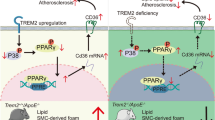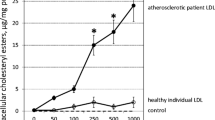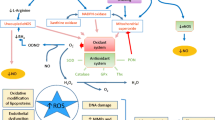Abstract
Recently, a novel endothelial oxidized low-density lipoprotein (LDL) receptor, lectin-like oxidized LDL receptor (LOX)-1, has been identified by the expression cloning of cultured bovine aortic endothelial cells (BAEC). The experimental evidence has suggested that LOX-1 may contribute to the development of vascular injury. For example, LOX-1 is upregulated in aorta from hypertensive, diabetic, and hyperlipidemic model animals. Also, LOX-1 overexpression is observed in atherosclerotic regions and damaged kidneys. In hypertensive animals, not only antihypertensive drugs but also antioxidant agents suppress the LOX-1 overexpression. Peroxisome proliferator-activated receptor-γ (PPARγ) activators inhibit cytokine-stimulated LOX-1 expression, possibly through their antioxidant effects, while, in contrast, LOX-1 generates reactive oxygen species (ROS). Therefore, ROS may play an important role in both the expression and function of LOX-1.
Similar content being viewed by others
Author information
Authors and Affiliations
Corresponding author
About this article
Cite this article
Ando, K., Fujita, T. Role of lectin-like oxidized low-density lipoprotein receptor-1 (LOX-1) in the development of hypertensive organ damage. Clin Exp Nephrol 8, 178–182 (2004). https://doi.org/10.1007/s10157-004-0288-9
Received:
Accepted:
Issue Date:
DOI: https://doi.org/10.1007/s10157-004-0288-9




